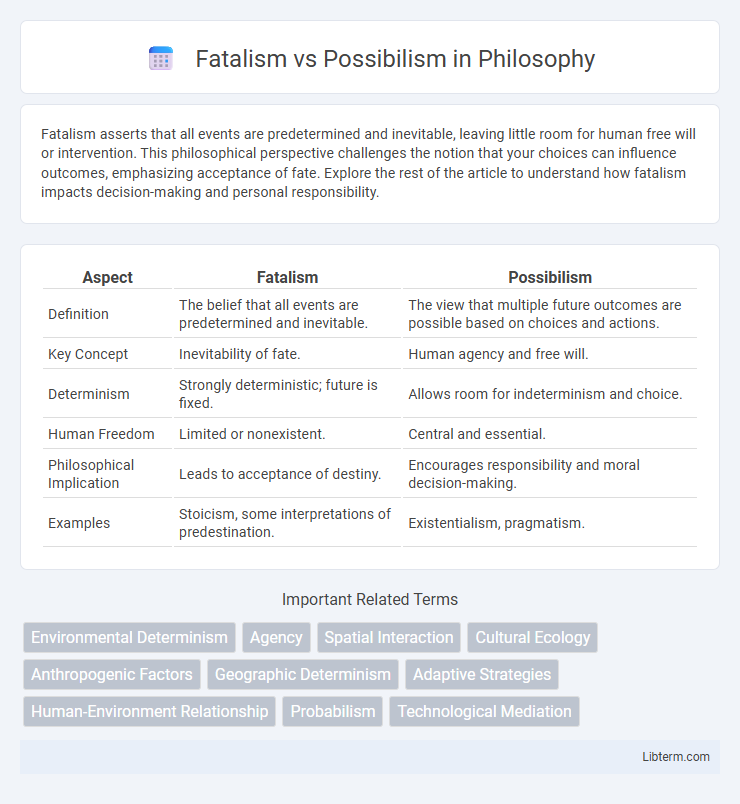Fatalism asserts that all events are predetermined and inevitable, leaving little room for human free will or intervention. This philosophical perspective challenges the notion that your choices can influence outcomes, emphasizing acceptance of fate. Explore the rest of the article to understand how fatalism impacts decision-making and personal responsibility.
Table of Comparison
| Aspect | Fatalism | Possibilism |
|---|---|---|
| Definition | The belief that all events are predetermined and inevitable. | The view that multiple future outcomes are possible based on choices and actions. |
| Key Concept | Inevitability of fate. | Human agency and free will. |
| Determinism | Strongly deterministic; future is fixed. | Allows room for indeterminism and choice. |
| Human Freedom | Limited or nonexistent. | Central and essential. |
| Philosophical Implication | Leads to acceptance of destiny. | Encourages responsibility and moral decision-making. |
| Examples | Stoicism, some interpretations of predestination. | Existentialism, pragmatism. |
Understanding Fatalism: Definition and Origins
Fatalism is the philosophical doctrine asserting that all events are predetermined and inevitable, rendering human efforts powerless to alter outcomes. Originating from ancient Stoic philosophy and further influenced by Eastern thought, fatalism emphasizes the unchangeable nature of fate or destiny. This concept contrasts sharply with notions of free will and agency, impacting ethical and existential debates throughout history.
Possibilism Explained: Foundations and Key Principles
Possibilism in geography emphasizes human agency and decision-making in shaping the environment, countering the deterministic perspective of fatalism. It is founded on key principles such as the recognition of multiple potential outcomes based on human choices and the adaptability of societies to environmental constraints. This approach highlights the dynamic interaction between people and their surroundings, promoting sustainable development through innovation and resource management.
Historical Perspectives on Human Agency
Historical perspectives on human agency reveal Fatalism as a belief that events are predetermined and inevitable, limiting individual control over outcomes. Possibilism challenges this by emphasizing human decision-making and the capacity to influence future events through choices and actions. These contrasting views have shaped philosophical debates and cultural attitudes toward free will and determinism throughout history.
Key Thinkers: Fatalism and Possibilism in Philosophy
Fatalism, prominently associated with the Stoics and philosophers like Chrysippus, asserts that all events are predetermined and inevitable, emphasizing the unchangeable nature of fate. In contrast, Possibilism, influenced by thinkers such as William James and Charles Sanders Peirce, advocates for the belief that multiple futures are possible and human agency plays a crucial role in shaping outcomes. These contrasting views highlight the philosophical debate between determinism and free will, central to discussions of morality and human action.
The Role of Environment in Shaping Human Destiny
Fatalism emphasizes that human destiny is largely predetermined by external forces, suggesting that environmental conditions are immutable factors controlling life outcomes. Possibilism, on the other hand, argues that the environment presents a range of possibilities but human agency and decision-making play critical roles in shaping individual and collective destinies. Environmental influences provide opportunities and constraints, yet human innovation, culture, and technology determine the extent to which these factors impact societal development.
Free Will vs Determinism: The Ongoing Debate
The ongoing debate between fatalism and possibilism centers on the extent of free will versus determinism in human actions and outcomes. Fatalism asserts that all events are predetermined and unavoidable, reducing human agency to an illusion, while possibilism acknowledges constraints but maintains that individuals can influence future possibilities through choices and actions. Philosophers and neuroscientists continue to explore how deterministic laws and probabilistic elements govern the interplay between destiny and autonomy in shaping reality.
Fatalism in Cultural and Religious Contexts
Fatalism in cultural and religious contexts often manifests as the belief that all events are predetermined and inevitable, shaping ethical behaviors and life choices in many traditions. In religions such as Hinduism and Islam, fatalism influences worldview through doctrines like karma and divine will, which emphasize acceptance of one's destiny as a spiritual or moral necessity. This concept also appears in various indigenous cultures, where fatalism guides rituals and social norms by attributing life outcomes to cosmic or ancestral forces beyond human control.
Possibilism and Modern Societal Development
Possibilism emphasizes human agency and creativity in shaping societal outcomes, highlighting that environmental and historical conditions influence but do not determine social development. Modern societal development reflects possibilism through technological innovation, urban planning, and policy-making that adapt to challenges rather than accept predestination. This approach drives sustainable growth, resilience, and cultural diversity by leveraging human potential and choice.
Real-World Examples: Case Studies and Applications
Fatalism, exemplified by the Cuban Missile Crisis, reflects the belief that outcomes are predetermined despite efforts to change them, as tensions escalated predictably toward nuclear confrontation. In contrast, possibilism is illustrated by Singapore's urban planning, where strategic policies and innovation enabled the city-state to overcome geographic limitations and realize economic growth. These case studies demonstrate how fatalism can underscore perceived inevitability in geopolitical conflicts, whereas possibilism drives adaptive strategies for sustainable development.
Reconciling Fatalism and Possibilism: Toward a Balanced Perspective
Reconciling fatalism and possibilism requires acknowledging that certain aspects of life may be predetermined while still allowing room for human agency and choice. Emphasizing a balanced perspective integrates the inevitability of fate with the dynamic potential for change, highlighting that outcomes result from a complex interplay of fixed conditions and individual decisions. This approach encourages adaptive thinking, where recognizing limits coexists with proactive efforts to influence future possibilities.
Fatalism Infographic

 libterm.com
libterm.com